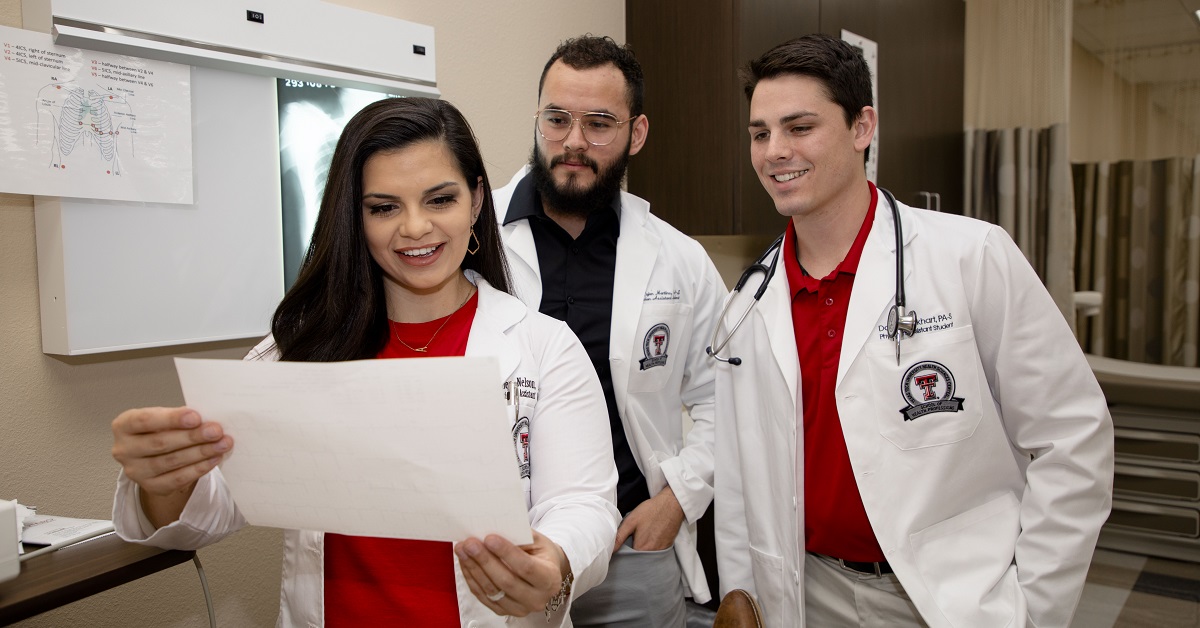Celebrating American Heart Month
During February, let’s learn more about heart health and look at how COVID-19 has affected this vital organ.

February is American Heart Month and is designated as a time for people to consider their cardiovascular health.
In recognition of American Heart Month, we spoke with Itxia Acevedo-Santiago, MPAS, PA-C, Assistant Professor in the Master of Physician Assistant Studies program, and Christina Robohm-Leavitt, DMSc, MS, PA-C, Associate Professor and Director of the Master of Physician Assistant Studies program in the TTUHSC School of Health Professions.
We discussed the causes and effects of heart disease, how COVID has affected heart health, and steps we can take to care for our hearts in stressful times.
Heart Health: Issues and Preventions
“Heart disease is the leading cause of death for men and women in all subpopulations,”
Robohm-Leavitt begins. “Someone has a heart attack every 40 seconds, and one in five
heart attacks are silent; The damage is done, but the individual may not be aware
they had a heart attack.”
Acevedo-Santiago says the biggest causes of heart disease are smoking, obesity, decreased
physical activity, high blood pressure, high low-density lipoprotein cholesterol and
diabetes.
“These are all things we can make lifestyle changes to live longer and healthier lives
to enjoy our time with our friends and family,” Robohm-Leavitt notes.
“It is unfortunate to know that one in three deaths in the United States is due to
heart disease,” Acevedo-Santiago says. “With that being said, almost half of those
die from coronary artery disease, which occurs when plaque builds up in your arteries.”
The Heart and Stress
Acevedo-Santiago points out that we are all living in extremely stressful times. While we can’t avoid the realities around us, we do have control over how we respond to them.
“One way is to focus on self-care,” Acevedo-Santiago says. “Self-care for our hearts is really self care for the whole self.”
Acevedo-Santiago suggests multiple ways to take care of our health during these stressful days. She recommends exercising an average of 150 minute per week and cooking meals that are low in sodium and unhealthy fats.
“Also, increase fruits and veggies and have them ready to eat when hunger strikes,” she suggests. She also recommends getting enough sleep, with seven to eight hours per night.
Maintaining yearly check-ups and physicals is a vital part of our self-care practice, according to Acevedo-Santiago. Understanding any medications you are prescribed and discussing your heart health with your doctor are integral in maintaining a healthy cardiovascular condition.
COVID and Heart Health
“COVID has been known to impact the entire body in one way or another,” Acevedo-Santiago says, regarding the effect COVID has had on heart health. “COVID can affect the heart by invading the muscle leading to inflammation within the tissue.”
There is also a potential for permanent damage to the heart muscle, which can lead to scarring. All of these together can lead to myocarditis, a condition that causes inflammation in the heart muscle and can eventually lead to heart failure, arrhythmias and increased risk for heart attack and stroke.
Acevedo-Santiago says there is evidence that COVID can also lead to inflammation in the lining of the vessels that transport blood throughout the body.
“When this happens, it can lead to increased formation of blood clots, which then increase the risk of stroke and heart attack and even more so increasing the risk of developing low oxygen levels leading to further heart damage.”
How to Acknowledge Heart Health Month
We asked our professionals for suggestions to celebrate heart health month.
“One way is to challenge yourself to be more active this month,” Acevedo-Santiago proposes.
Robohm-Leavitt suggests sponsoring a contest or challenge for your organization to see who takes the most “steps” on their activity trackers. And both mentioned wearing red on the first Friday of February for National Wear Red Day, raising awareness about heart disease.
It’s also a great time to amplify the awareness on social media or make a donation to the American Heart Association’s Go Red or other fundraising campaigns.
What better time than now to consider our heart health and make the necessary lifestyle changes to ensure a longer, healthier life?
Related Stories
The John Wayne Cancer Foundation Surgical Oncology Fellowship Program at Texas Tech University Health Sciences Center Announced
TTUHSC is collaborating with the John Wayne Cancer Foundation and has established the Big Cure Endowment, which supports the university’s efforts to reduce cancer incidence and increase survivability of people in rural and underserved areas.
Making Mental Health a Priority in the New Year
Sarah Mallard Wakefield, M.D., a psychiatrist with Texas Tech Physicians, talks about strategies to combat widespread and growing anxiety.
TTUHSC Dean to be Inducted into the National Academies of Practice as Distinguished Fellow
Gerard E. Carrino, Ph.D., MPH, dean of the TTUHSC Julia Jones Matthews School of Population and Public Health, will be inducted into the National Academies of Practice (NAP) as a Distinguished Fellow of the Public Health Academy.
Recent Stories
National Academy of Inventors Names TTUHSC Faculty Senior Members
The National Academy of Inventors (NAI) has designated two current and one former TTUHSC faculty researchers as Senior Members.
The John Wayne Cancer Foundation Surgical Oncology Fellowship Program at Texas Tech University Health Sciences Center Announced
TTUHSC is collaborating with the John Wayne Cancer Foundation and has established the Big Cure Endowment, which supports the university’s efforts to reduce cancer incidence and increase survivability of people in rural and underserved areas.
TTUHSC Receives $1 Million Gift from Amarillo National Bank to Expand and Enhance Pediatric Care in the Panhandle
TTUHSC School of Medicine leaders accepted a $1 million philanthropic gift from Amarillo National Bank on Tuesday (Feb. 10), marking a transformational investment in pediatric care for the Texas Panhandle.
